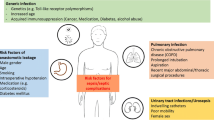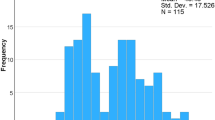Abstract
Aims
Staphylococcus aureus bloodstream infection is one of the most common serious bacterial infections worldwide. It represents a heterogenous clinical entity with a high risk of metastatic complications and a high in-hospital mortality ranging between 20 and 30%. The outcome can be improved by optimised diagnostic and therapeutic management. Thus, our minireview should provide important and often missed pieces of information in the management of S. aureus bloodstream infection.
Methods
We describe the essentials in the management of S. aureus bloodstream infection.
Results
Five essentials were identified: 1) S. aureus bacteremia should always be considered clinically significant. 2) Length of bacteremia and fever is relevant for diagnostic workup, duration of therapy and prognosis. 3) Prompt identification and eradication of portal of entry and infective/metastatic foci are essential. 4) Infective endocarditis should be excluded. 5) Intravenous treatment for at least two weeks up to 4–6 weeks with antistaphylococcal penicillins for MSSA and vancomycin or daptomycin for MRSA bloodstream infection is indicated.
Conclusion
Further efforts should be undertaken to increase the adherence to the essentials in the management of S. aureus bloodstream infection.
Similar content being viewed by others
References
Fowler VG Jr, Olsen MK, Corey GR, Woods CW, Cabell CH, Reller LB, et al. Clinical identifiers of complicated Staphylococcus aureus bacteremia. Arch Intern Med. 2003;163:2066–72 (epub 2003/09/25).
Lehmann C, Berner R, Bogner JR, Cornely OA, de With K, Herold S, et al. The “choosing wisely” initiative in infectious diseases. Infection. 2017;45:263–8 (epub 2017/03/16).
Kaasch AJ, Barlow G, Edgeworth JD, Fowler VG Jr, Hellmich M, Hopkins S, et al. Staphylococcus aureus bloodstream infection: a pooled analysis of five prospective, observational studies. J infect. 2014;68:242–51 (epub 2013/11/20).
Rieg S, Kupper MF. Infectious diseases consultations can make the difference: a brief review and a plea for more infectious diseases specialists in Germany. Infection. 2016;44:159–66 (epub 2016/02/26).
Palraj BR, Baddour LM, Hess EP, Steckelberg JM, Wilson WR, Lahr BD, et al. Predicting risk of endocarditis using a clinical tool (PREDICT): scoring system to guide use of echocardiography in the management of Staphylococcus aureus bacteremia. Clin Infect Dis. 2015;61:18–28 (epub 2015/03/27).
Nagao M, Yamamoto M, Matsumura Y, Yokota I, Takakura S, Teramukai S, et al. Complete adherence to evidence-based quality-of-care indicators for Staphylococcus aureus bacteremia resulted in better prognosis. Infection. 2017;45:83–91 (epub 2016/10/07).
Karchmer AW. Definitive treatment for methicillin-susceptible Staphylococcus aureus bacteremia: data versus a definitive answer? Clin infect Dis. 2017;65:107–9 (epub 2017/04/06).
Liu C, Bayer A, Cosgrove SE, Daum RS, Fridkin SK, Gorwitz RJ, et al. Clinical practice guidelines by the Infectious Diseases Society of America for the treatment of methicillin-resistant Staphylococcus aureus infections in adults and children. Clin infect Dis. 2011;52:e18–55 (epub 2011/01/07).
Author information
Authors and Affiliations
Corresponding author
Ethics declarations
Conflict of interest
In the last 3 years, NJ has received lecture fees from Labor Stein, Novartis, Gilead, Infectopharm and MSD and travel grants from Gilead, Novartis and Basilea. In the last 3 years, SR has received lecture fees from Pfizer and Limbach Gruppe SE.
Rights and permissions
About this article
Cite this article
Jung, N., Rieg, S. Essentials in the management of S. aureus bloodstream infection. Infection 46, 441–442 (2018). https://doi.org/10.1007/s15010-018-1130-8
Received:
Accepted:
Published:
Issue Date:
DOI: https://doi.org/10.1007/s15010-018-1130-8




